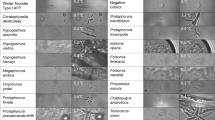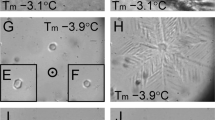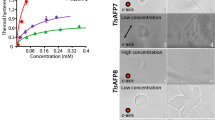Abstract
Certain bacteria promote the formation of ice in super-cooled water by means of ice nucleators which contain a unique protein associated with the cell membrane1. Ice nucleators in general are believed to act by mimicking the structure of an ice crystal surface, thus imposing an ice-like arrangement on the water molecules in contact with the nucleating surface and lowering the energy necessary for the initiation of ice formation2. Quantitative investi-gation of the bacterial ice-nucleating process has recently been made possible by the discovery of certain bacteria that shed stable membrane vesicles with ice nucleating activity3. The opposite effect, inhibition of ice formation, has been described for a group of glycoproteins found in different fish and insect species4,5. This group of substances, termed antifreeze glycoproteins (AFGPs), promotes the supercooling of water with no appreciable effect on the equilibrium freezing point or melting temperature6. Substantial evidence now indicates that AFGPs act by binding to a growing ice crystal and slowing crystal growth7,8. As the ice-nucleating protein surface is believed to have a structure similar to an embry-onic ice crystal, AFGPs might be predicted to interact directly with a bacterial ice-nucleating site. We report here that AFGPs from the antarctic fish Dissostichus mamoni inhibit the ice-nucleating activity of membrane vesicles from the bacterium Erwinia herbicola. The inhibition effect shows saturation at high concentration of AFGP and conforms to a simple binding reaction between the AFGP and the nucleation centre.
This is a preview of subscription content, access via your institution
Access options
Subscribe to this journal
Receive 51 print issues and online access
$199.00 per year
only $3.90 per issue
Buy this article
- Purchase on Springer Link
- Instant access to full article PDF
Prices may be subject to local taxes which are calculated during checkout
Similar content being viewed by others
References
Wolber, P. K. et al. Proc. natn. Acad. Sci. U.S.A. 83, 7256–7260 (1986).
Knight, C. A. The Freezing of Supercooled Liquids (Van Nostrand, Princeton, 1967).
Phelps, P., Giddings, T. H., Prochoda, M. & Fall, R. J. Bact. 167, 496–502 (1986).
DeVries, A. L. A. Rev. Physiol. 45, 245–260 (1983).
Duman, J. Cryobiology 19, 613–627 (1982).
DeVries, A. L., Komatsu, S. K. & Feeney, R. E. J. biol. Chem. 245, 2901–2908 (1970).
Raymond, J. A. & DeVries, A. L. Proc. natn. Acad. Sci. U.S.A. 74, 2589–2593 (1977).
Brown, R. A., Yeh, Y., Burcham, T. S. & Feeney, R. E. Biopolymers 24, 1265–1270 (1985).
Vali, G. J. atmos. Sci. 28, 402–409 (1971).
Parody-Morreale, A., Bishop, G. A., Fall, R. & Gill, S. J. Analy. Biochem. 154, 682–690 (1986).
Govindarajan, A. G. & Lindow, S. E. Proc. natn. Acad. Sci. U.S.A. 85, 1334–1338 (1988).
Author information
Authors and Affiliations
Rights and permissions
About this article
Cite this article
Parody-Morreale, A., Murphy, K., Cera, E. et al. Inhibition of bacterial ice nucleators by fish antifreeze glycoproteins. Nature 333, 782–783 (1988). https://doi.org/10.1038/333782a0
Received:
Accepted:
Issue Date:
DOI: https://doi.org/10.1038/333782a0
This article is cited by
-
Synthesis and characterization of natural and modified antifreeze glycopeptides: glycosylated foldamers
Amino Acids (2011)
-
Antifreeze glycopeptide analogues: microwave-enhanced synthesis and functional studies
Amino Acids (2010)
-
Antifreeze Protein in Antarctic Marine Diatom, Chaetoceros neogracile
Marine Biotechnology (2010)
-
In silico characterization of antifreeze proteins using computational tools and servers
Journal of Chemical Sciences (2007)
Comments
By submitting a comment you agree to abide by our Terms and Community Guidelines. If you find something abusive or that does not comply with our terms or guidelines please flag it as inappropriate.



